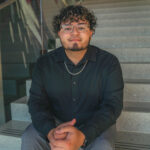
Meet Noah Cruz, a senior pursuing B.S. degrees in both psychology and biological sciences on the pre-med/Ph.D. track. As a first generation student and a member of multiple scholars programs, Noah takes part in student organizations and undergraduate research while also following his passions of advocating for underrepresented students in STEM (science, technology, engineering, and mathematics) fields. We can’t wait to see where Noah goes from here, and we’re excited to share his story.
Q: Tell us about yourself. What would you want another Retriever to know about you?
A: I am a senior concurrently pursuing dual bachelor of science degrees in psychology and biological sciences, complemented by minors in chemistry and photography on the Pre-M.D./Ph.D. track. I take pride in being a first-generation Salvadoran American student, and I am a strong advocate for underrepresented students in STEM. I am from Rockville, Maryland, and went to Northwood High School where I earned my associates degree and high school diploma concurrently.
I am also one out of 200,000 patients with a rare blood disorder called idiopathic thrombocytopenic purpura. Idiopathic means “of unknown cause.” This highlights the importance of bridging the gap within the immunological field of research, and drives me toward pursuing a career in the biomedical sciences!
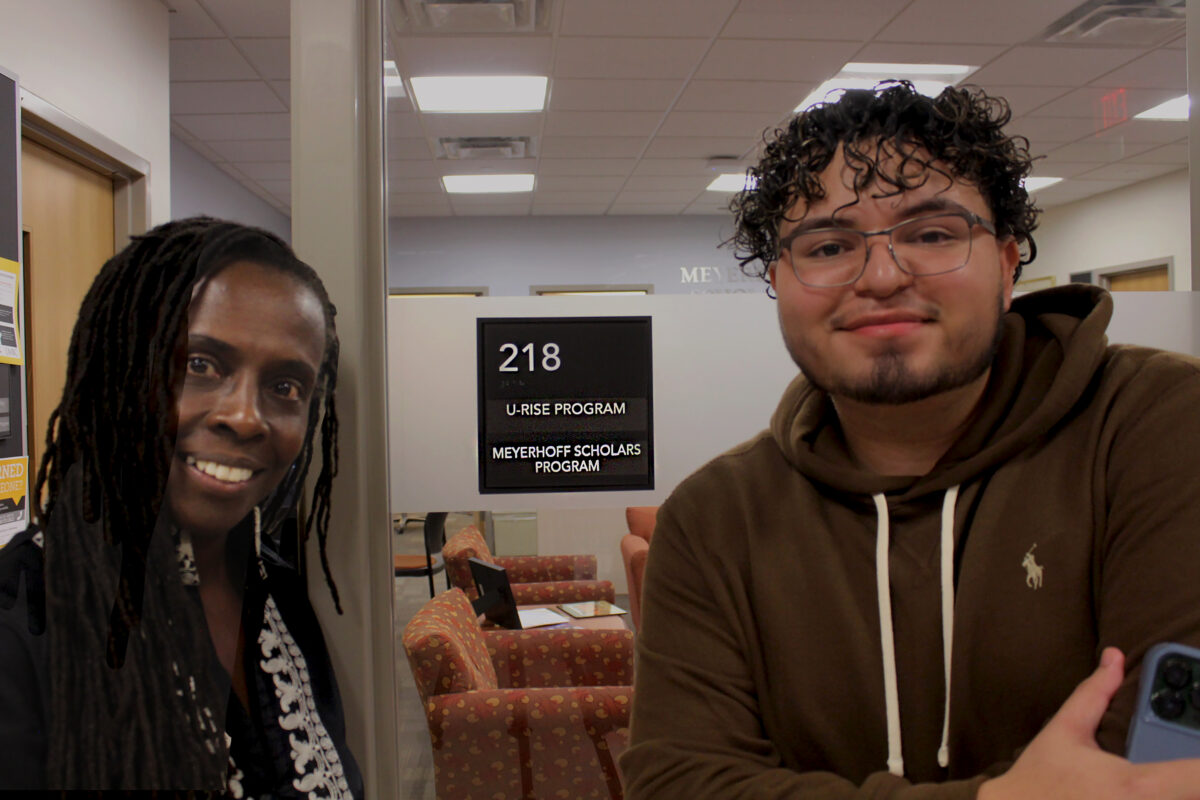 Noah Cruz (right) with Jacqueline King, associate director of the U-RISE Program (left), in front of the Meyerhoff and U-RISE Scholars Program Office. Photo courtesy of Cruz.
Noah Cruz (right) with Jacqueline King, associate director of the U-RISE Program (left), in front of the Meyerhoff and U-RISE Scholars Program Office. Photo courtesy of Cruz.
Q: Tell us about someone in the community who has inspired you or supported you, and how they did it.
A: There are numerous individuals who come to mind, and I am truly grateful for their unwavering support throughout my academic journey. Among them, Dr. Jacqueline King stands out as a cornerstone of support in my experience at UMBC. She has not only served as my advisor but has also been my steadfast advocate and personal cheerleader for all my accomplishments. Her inspiration has propelled me forward on the challenging path of higher education.
Another significant supporter of my aspirations is Dr. Charles Bieberich. His unwavering support, mentorship, and profound knowledge of the scientific field have been instrumental in motivating me to pursue my M.D./Ph.D. journey. I also extend my heartfelt thanks to Dr. Diana Hamilton. She not only supervises my principles of chemistry teaching assistantship but also provides unwavering support for all my academic pursuits.
Additionally, I must express my gratitude to Dr. Sarah Leupen for her invaluable support in my academic endeavors. Each of these individuals saw potential in me that I often failed to recognize within myself. As a first-generation student navigating the complexities of higher education, their investment in my education—offering support, mentorship, and words of encouragement—has made an indelible impact on my journey. I cannot express my appreciation enough for their contributions to my academic success.
Q: What do you love most about your academic program or an organization you’re involved in?
A: UMBC’s psychology and biology departments have played a pivotal role in shaping my academic journey, and I couldn’t be more appreciative of the invaluable resources and experiences they have provided me. One of the aspects I truly love about this academic program is the seamless integration of interdisciplinary approaches within the psychology and biology departments. One of the standout features of this program is how it effectively connects the dots between neuroscience, behavioral pathology, genetics, and biology.
“As a first-generation student navigating the complexities of higher education, their investment in my education—offering support, mentorship, and words of encouragement—has made an indelible impact on my journey.
Noah Cruz ’24
This holistic approach has not only broadened my horizons but has also allowed me to harness the power of knowledge across these fields to enhance my own research. Whether it’s understanding the intricacies of brain function or delving into the biological underpinnings of behavior, UMBC’s program has provided me with a well-rounded education that I can leverage in my academic pursuits.
Currently, I am fortunate to be involved in neuroscience clinical research at the University of Maryland School of Medicine. The foundation laid by UMBC’s program has been instrumental in my ability to contribute effectively to this research. The skills, knowledge, and interdisciplinary perspective I gained from my time in UMBC’s psychology and biology departments have proven to be a significant advantage in my work at the School of Medicine.
Q: Since you’ve been a part of the UMBC community, how have you found support of your WHY?
A: During my time at UMBC, Peter DeCrescenzo played an indispensable role in jumpstarting my academic and career journey. As a newcomer to the university and a Louis Stokes Alliance for Minority Participation (LSAMP) Scholar, I was initially unaware of the vast opportunities and resources available to me in the field of biomedical research and academia. Peter’s guidance and support proved to be transformative in several ways. Firstly, he provided me with invaluable guidance on crafting a compelling resume—a crucial tool in presenting myself as a competitive candidate for various academic and research endeavors.
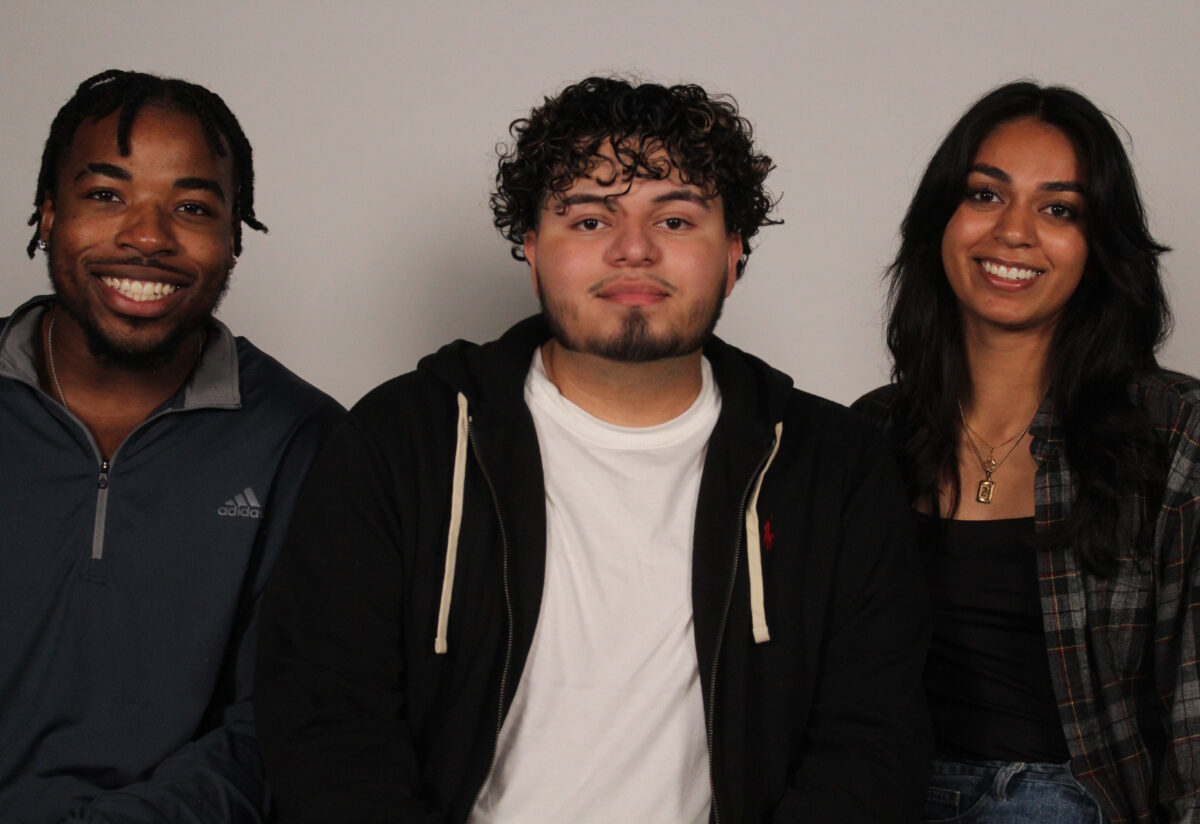
Cruz states that much of his success could be attributed to his strong support system among his close friends, including (L-R): Arian Nyandjo’24, Noah Cruz’24, Zainab Bharmal’24, and Chioma Iheacho’24 (not pictured). Photo courtesy of Cruz.
Additionally, Peter equipped me with the skills necessary to create engaging and informative poster presentations, an asset that would prove indispensable in showcasing my research projects. He also encouraged me to explore and apply to other scholars’ programs, ultimately leading to my acceptance into the U-RISE Program, a significant milestone in my academic journey.
Overall, Peter’s unwavering support and mentorship initiated a pathway to academic excellence that I had never imagined. His guidance not only imparted practical skills but also instilled in me the confidence to pursue my academic goals. Peter DeCrescenzo’s dedication to my growth at UMBC made a profound difference in my academic journey and played a pivotal role in shaping my career in biomedical research and academia.
Q: What clubs, teams, or organizations are you a part of? What do you love about them and why?
A: I am an active member of two significant organizations at UMBC, and each role holds special meaning for me. Firstly, as the Meyerhoff Scholars lead peer advisor, I have the incredible opportunity to serve as a mentor and guide to incoming first-year and sophomore students, assisting them as they embark on their college journey. What I truly cherish about this role is the chance to share my own experiences and knowledge with these students, offering them valuable insights and personal support to succeed academically and personally.
One of the most rewarding aspects of being a lead peer advisor is assisting students with their applications for scholarships, internships, and research positions. I am deeply passionate about helping students navigate the intricate and competitive application procedures, ensuring that underrepresented minority students are consistently represented in science-related settings.
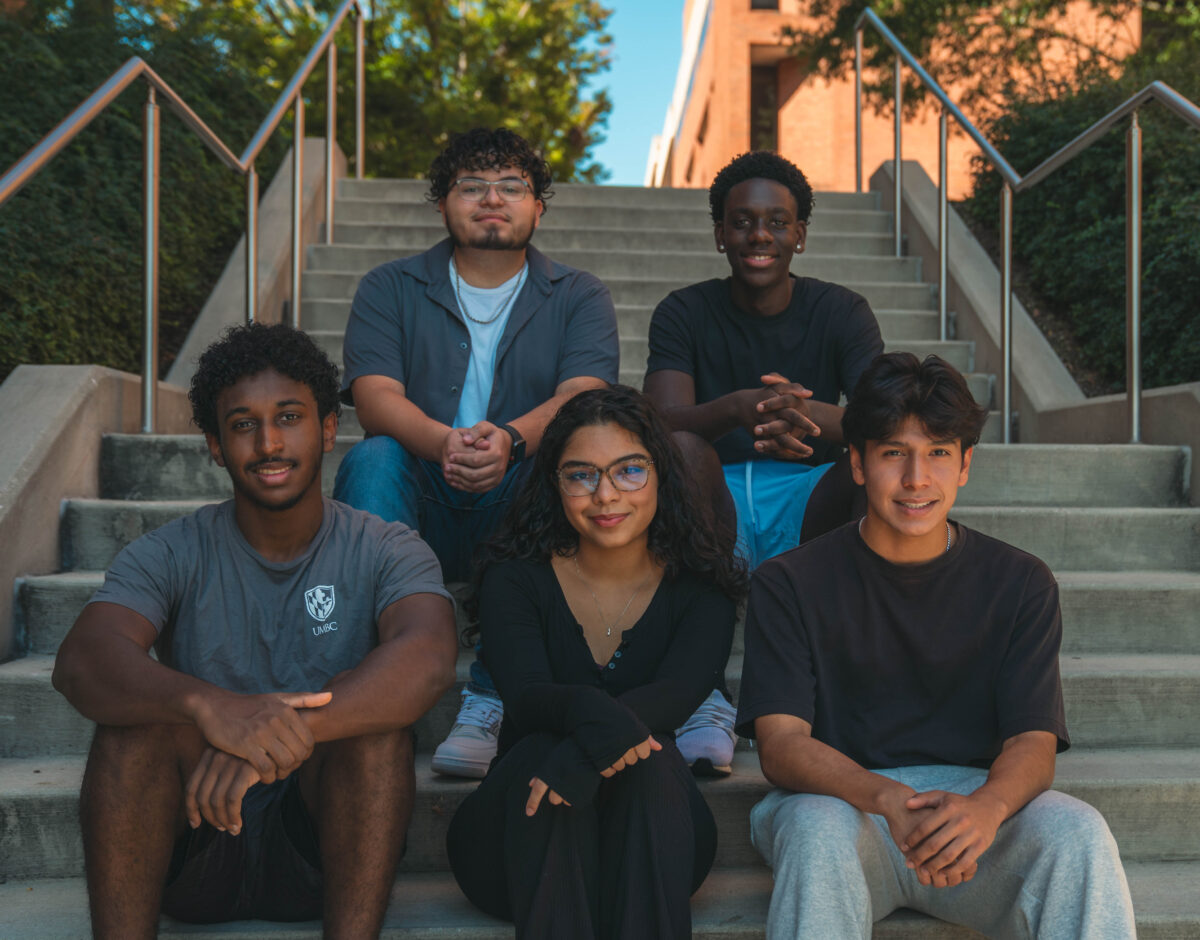 Cruz with his advisees, including students from the Meyerhoff, U-RISE, LSAMP, and McNair Scholars programs. Bottom (L-R): Emmanuel Mekasha ’25, Lesley Hernandez ’25, Christian Verastegui ’25. Top (L-R): Noah Cruz ’24, Maxwell Amoh-Mayes ’26. (Photo courtesy of Julianna Falconer’24)
Cruz with his advisees, including students from the Meyerhoff, U-RISE, LSAMP, and McNair Scholars programs. Bottom (L-R): Emmanuel Mekasha ’25, Lesley Hernandez ’25, Christian Verastegui ’25. Top (L-R): Noah Cruz ’24, Maxwell Amoh-Mayes ’26. (Photo courtesy of Julianna Falconer’24)
Secondly, my role as vice president of the Society of Advancing Chicanos/Hispanics & Native Americans in Science (SACNAS) holds a special place in my heart. SACNAS is dedicated to promoting diversity and inclusion in STEM fields, and as VP, I play a pivotal role in building a supportive community for underrepresented students. Organizing events, creating networking opportunities, and collaborating with like-minded individuals to advance our mission is both fulfilling and impactful. It’s inspiring to see students from diverse backgrounds come together to pursue their passions in science while breaking down barriers and stereotypes.
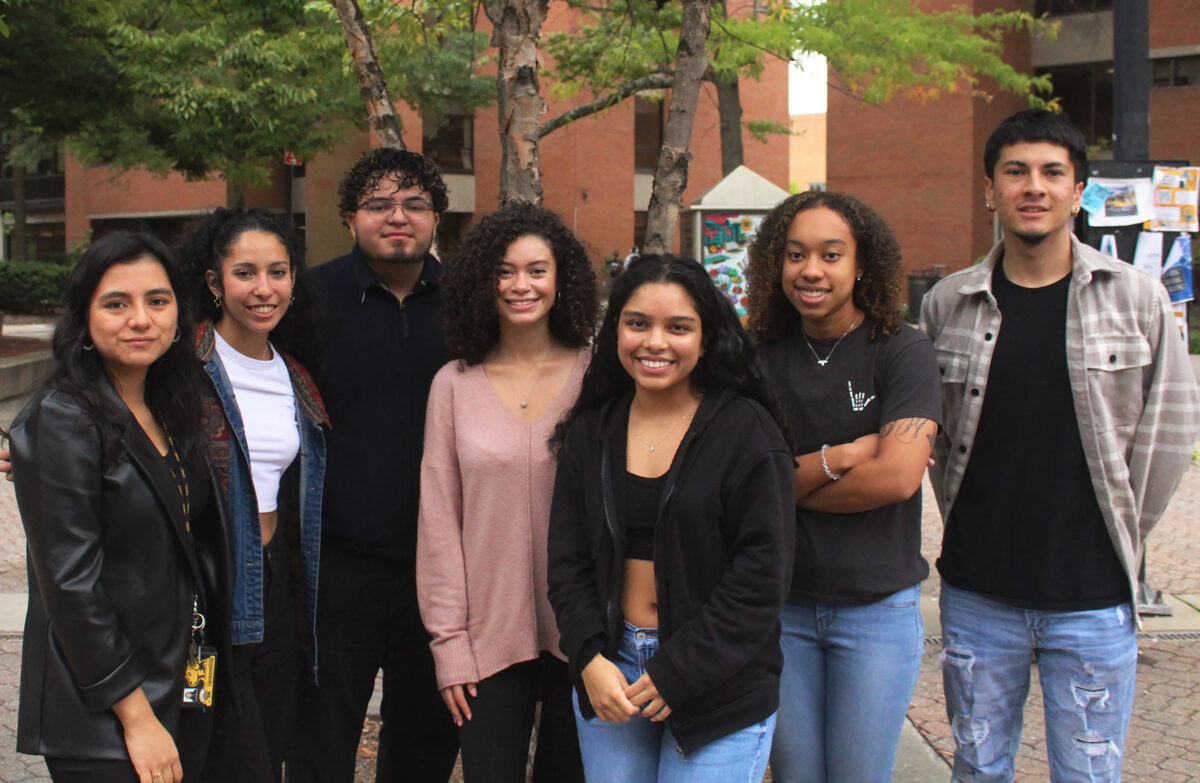 UMBC’s Society of Advancing Chicanos/Hispanics and Native Americans in Science (SACNAS) E-board, from left to right: Isabella Salguero Cespedes (Hispanic/Latino Student Council Representative), Isabella Lopez (Event Coordinator), Noah Cruz (Vice-President), Tatiana Perez (President), Lesley Hernandez (Treasurer), Viviana Smart (Secretary), Eduardo Ramirez (Social Media & Promotion Chair). Photo courtesy of Cruz.
UMBC’s Society of Advancing Chicanos/Hispanics and Native Americans in Science (SACNAS) E-board, from left to right: Isabella Salguero Cespedes (Hispanic/Latino Student Council Representative), Isabella Lopez (Event Coordinator), Noah Cruz (Vice-President), Tatiana Perez (President), Lesley Hernandez (Treasurer), Viviana Smart (Secretary), Eduardo Ramirez (Social Media & Promotion Chair). Photo courtesy of Cruz.
Q: As a first-generation college student, what would you tell others who are in your shoes about UMBC?
A: Navigating the world of secondary education, especially as the first in my family to graduate high school and attend college, was undoubtedly an intimidating and overwhelming experience. One piece of advice I would offer to others in my shoes about UMBC is the critical importance of building a solid support system. Throughout my college journey, I found that my advisors and supporters played a pivotal role in my success.
These mentors believed in me from day one, providing guidance, encouragement, and a sense of belonging on campus. Having a support system is like having a lifeline when facing the myriad challenges that college life can present. They can offer valuable insights into academic decisions, personal development, and even career choices. Advisors and mentors can help you navigate the complexities of course selection, major choices, and extracurricular activities, ensuring that you make informed decisions that align with your goals.
* * * * *
UMBC’s greatest strength is its people. When people meet Retrievers and hear about the passion they bring, the relationships they create, the ways they support each other, and the commitment they have to inclusive excellence, they truly get a sense of our community. That’s what “Meet a Retriever” is all about.





